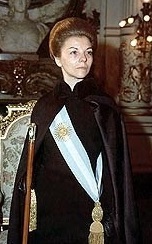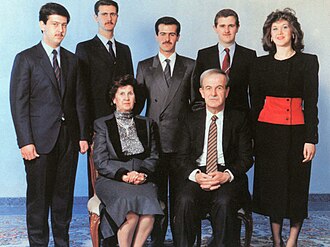
Kim Jong-il was a North Korean politician who was the second supreme leader of North Korea from 1994 to 2011. He led North Korea from the 1994 death of his father Kim Il-sung, the first Supreme Leader, until his own death in 2011, when he was succeeded by his son, Kim Jong-un.

Kim Jong-nam was the eldest son of North Korean leader Kim Jong-il. From roughly 1994 to 2001, he was considered the heir apparent to his father. He was thought to have fallen out of favour after embarrassing the regime in 2001 with a failed attempt to visit Tokyo Disneyland with a false passport, although Kim himself said his loss of favour had been due to advocating reform.
Kim Jong-chul, sometimes spelled Kim Jong Chol, is a son of former North Korean Supreme Leader Kim Jong-il. His younger brother is current Supreme Leader Kim Jong-un. His older half-brother Kim Jong-nam was assassinated in February 2017.

In the North Korean government, the Cabinet is the administrative and executive body. The North Korean government consists of three branches: administrative, legislative, and judicial. However, they are not independent of each other, but all branches are under the exclusive political leadership of the Workers' Party of Korea (WPK).

Kim Jong-un is a North Korean politician who has been Supreme Leader of North Korea since 2011 and the leader of the Workers' Party of Korea (WPK) since 2012. He is a son of Kim Jong-il, who was North Korea's second supreme leader from 1994 to 2011, and Ko Yong-hui. He is a grandson of Kim Il-sung, who was the founder and first supreme leader of North Korea from its establishment in 1948 until his death in 1994.

Eternal leaders of Juche Korea refers to the practice of granting posthumous titles to deceased leaders of North Korea. The phrase "Eternal leaders of Juche Korea" was established by a line in the preamble to the Constitution, as amended on 30 June 2016, and in subsequent revisions.

The Supreme Commander of the Armed Forces of Democratic People's Republic of Korea is the commander-in-chief of the Korean People's Army, the military of North Korea. The office was established on 4 July 1950 and abolished with the passing of a new constitution in 1972. Since then, the office of President of North Korea, the Chairman of the National Defence Commission and the President of the State Affairs Commission have been referred to as supreme commanders in accordance with the constitution.
A supreme leader or supreme ruler typically refers to the person among a number of leaders of a state, organization or other such group who has been given or is able to exercise the most – or complete – authority over it. In a religion, this role is usually satisfied by a person deemed to be the representative or manifestation of a Deity or God on Earth. In politics, a supreme leader usually rules over an authoritarian or totalitarian government and have a cult of personality associated with them. Historic examples are Adolf Hitler of Nazi Germany, Benito Mussolini of Fascist Italy, and Joseph Stalin of the Soviet Union.

O Jin-u was a general and politician of North Korea. He was the Minister of Armed Forces from May 1976 until his death in February 1995. O was considered the third most powerful person in North Korea, after Kim Il-sung and his son Kim Jong-il, therefore making him the most powerful person that possessed no blood relations to the Kim family. Very little is known about him except for the fact that he served with Kim Il-sung's partisan unit and eventually rose through the ranks of the North Korean Army. Thanks to his relationship with Kim Il-sung, O Jin-u was able to enjoy wealth and fame, this lasted even under Kim Jong-il. He distinguished himself during the Korean War and was a trusted adviser of the North Korean leader until his death, also being his chief guard in 1945.

The Workers' Party of Korea (WPK) is the founding and sole ruling party of the Democratic People's Republic of Korea. It is the largest party represented in the Supreme People's Assembly and coexists de jure with two other legal parties making up the Democratic Front for the Reunification of the Fatherland. However, these minor parties are completely subservient to the WPK, and must accept the WPK's "leading role" as a condition of their existence. Founded in 1949 from the merger of the Workers' Party of North Korea and the Workers' Party of South Korea, the WPK is the oldest active party in Korea and also controls the Korean People's Army.
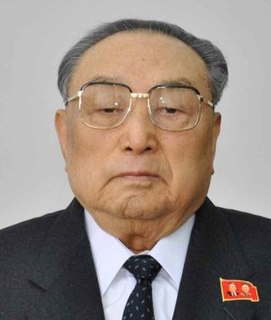
Kim Yong-ju was a North Korean politician and the younger brother of Kim Il-sung, who ruled North Korea from 1948 to 1994. Under his brother's rule, Kim Yong-ju held key posts including Politburo member in the Workers' Party of Korea (WPK) during the 1960s and early 1970s, but he fell out of favour in 1974 following a power struggle with Kim Jong-il. From 1998 on he held the ceremonial position of Honorary Vice President of the Presidium of the Supreme People's Assembly (SPA), North Korea's parliament.

The North Korean cult of personality surrounding its ruling family, the Kim family, has existed in North Korea for decades and can be found in many examples of North Korean culture. Although not acknowledged by the North Korean government, many defectors and Western visitors state there are often stiff penalties for those who criticize or do not show "proper" respect for the regime. The personality cult began soon after Kim Il-sung took power in 1948, and was greatly expanded after his death in 1994.

Kim Yo-jong is a North Korean politician and diplomat serving as the Deputy Department Director of the Publicity and Information Department of the Workers' Party of Korea, or WPK. She also served as an alternate member of the Politburo of the Workers' Party of Korea from 2017 to 2019, and again from 2020 to 2021. Since September 2021, she has also served as a member of State Affairs Commission of North Korea, the only woman on the panel.
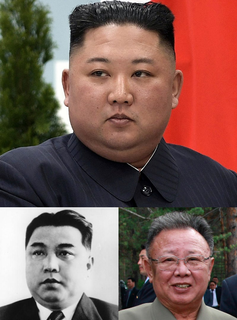
The Kim family, referred to as the Mount Paektu bloodline in the ideological discourse of the Workers' Party of Korea (WPK) and sometimes as the Kim dynasty by foreign observers, is a three-generation lineage of North Korean leadership descending from the country's founder and first leader, Kim Il-sung. In 1948, Kim Il-sung came to rule the North after the end of Japanese rule in 1945 split the region. He began the Korean War in 1950 in a failed attempt to reunify the Korean Peninsula. In the 1980s, Kim Il-sung had developed a cult of personality closely tied to the North Korean state philosophy of Juche. Following his death in 1994, Kim Il-sung's cult of personality was passed on to his son, Kim Jong-il, and then to his grandson, Kim Jong-un. All three men have served as leaders of the WPK and have exercised absolute control over the country.
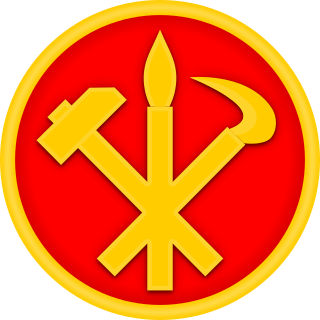
The Propaganda and Agitation Department, officially the Publicity and Information Department, is a department of the Central Committee of the Workers' Party of Korea (WPK) tasked with coordinating the creation and dissemination of propaganda in North Korea. It is the highest propaganda organization in the country.

The Kapsan Faction Incident was an unsuccessful attempt to undermine the power of Kim Il-sung, the leader of North Korea, around the year 1967. The "Kapsan faction" was a group of veterans of the anti-Japanese struggle of the 1930s and 1940s that was initially close to Kim Il-sung. In the wake of the 2nd Conference of the Workers' Party of Korea (WPK) in 1966, the faction sought to introduce economic reforms, challenge Kim Il-sung's cult of personality, and appoint its ringleader Pak Kum-chol as his successor.
Ri Yong-suk was a North Korean politician and revolutionary. A veteran of the anti-Japanese struggle, Ri had close relations with all three generations of the Kim dynasty. During WWII, she was with Kim Il-sung in the Soviet 88th Separate Rifle Brigade. During the Korean War, she took care of Kim Jong-il. Under Kim Jong-un, she was portrayed as a link between the original guerrilla generation and the current leadership. Ri was elected to the Supreme People's Assembly in 1998 and 2003.
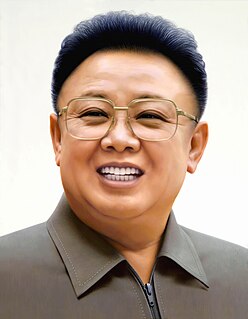
Many countries, organizations, and individuals issued reactions to the death of Kim Jong-il in December 2011. According to CNN, reactions were "somewhat muted" in comparison to deaths of other world leaders. Just a few countries reacted immediately after Kim's death was announced on North Korea's KCTV. Some countries, like the United States, took the opportunity to comment on their relationship with South Korea. South Korea decided not to offer official condolences, mirroring both worsened relations after the ROKS Cheonan sinking and the bombardment of Yeonpyeong and its position after the death of Kim Il-sung in 1994. Chinese Foreign Ministry called Kim a "great leader" and added that Beijing would continue to offer its support. Japan expressed condolences and said it hoped Kim's death would not affect the region adversely. Reactions in Europe were "a mix of hope and watchfulness". In North Korea, the official reaction was grief and support for the succession of Kim Jong-un.

Press freedom predator is an anti-award distributed every few years by Reporters Without Borders. It is attributed to heads of state or groups who are deemed to have a negative effect on press freedom.
